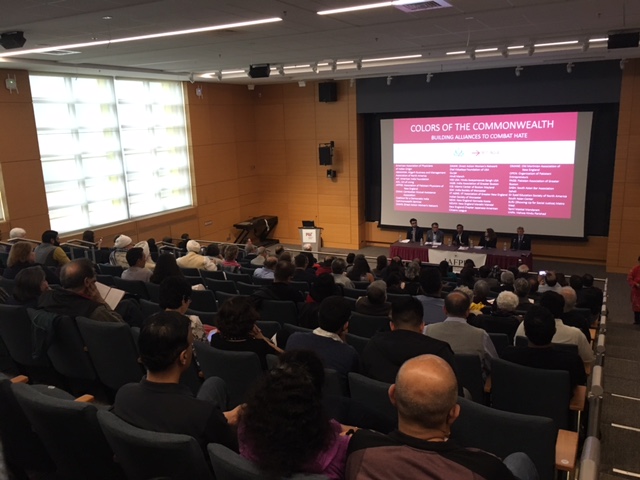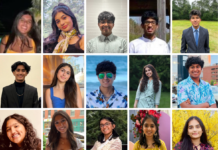BOSTON, MA - The Indian American Forum for Political Education-Massachsetts (IAFPE) and MIT-India with the support of 34 community organizations held a panel discussion on Saturday to address local racism at the MIT Wong Auditorium in Cambridge, MA. The event was supported by 34 community organizations, IAFPE said in a statement.
“IAFPE invites all Massachusetts based organizations and any other group who oppose hate, hate crimes, and racism regardless of membership race, color, religion, creed, sex, sexual orientation, gender identity, national origin, ancestry, and disability to sign-on and stand together as a coalition,” the statement said.

The panel discussion sought to address the recent wave of racially motivated hate crimes like the murder of Indian engineer Srinivas Kuchibhotla in Kansas. These hate crimes have raised alarm not only among Massachusetts based Indian American and South Asian communities, but all community members who feel that recent federal immigration reforms and executive orders are having a divisive impact on communities throughout the country and state.
Entitled “The Colors of the Commonwealth” the panel served as a call to action for concerned Massachusetts residents to come together and discuss effective community responses, strategies, and resources to combatting racism and hate crimes, including; civic education, reaching out to law enforcement and government officials, and social activism.
The Colors of the Commonwealth event program featured Boston Police Department Commissioner William Evans, Attorney General’s Office Chief of Civil Rights Division Genevieve Nadeau, Islamic Society of Boston Cultural Center Community Outreach Lead Kashif Syed, New England Anti Defamation League Executive Director Robert Trestan, Harvard Business School Professor of Marketing and co-chair of the Social Enterprise Initiative, MIT professor and documentary filmmaker Vivek Bald, Malcolm P. McNair Professor of Marketing at Harvard Business School Dr. V. Kasturi Rangan and MIT Political Scientist Dr. Kenneth Oye who covered ways to ensure hate crimes against anyone in the Commonwealth can be properly tracked, discussed and what models exist to support awareness and solutions against these crimes.
 “On behalf of the Forum, thank you to all our program speakers and our audience for participating in an insightful conversation at Colors of the Commonwealth,” said IAFPE President Sonali Lappin. “We look forward to ensuring we reach out to and include all groups and their perspectives in the diversity of this coalition. We value your work and the experiences of your membership around hate crimes, racism, and educating community. This is just the beginning of many more conversations and events that will help foster dialogue and spark action.”
“On behalf of the Forum, thank you to all our program speakers and our audience for participating in an insightful conversation at Colors of the Commonwealth,” said IAFPE President Sonali Lappin. “We look forward to ensuring we reach out to and include all groups and their perspectives in the diversity of this coalition. We value your work and the experiences of your membership around hate crimes, racism, and educating community. This is just the beginning of many more conversations and events that will help foster dialogue and spark action.”
IAFPE Board of Trustees Chair Ramesh Advani expressed the sentiment by quoting reporter Chistiane Amanpour as saying that bad things happen and when good people do nothing.
 “As Chistiane Amanpour said, ‘Bad things happen when good people do nothing’. It is time we all unite to find common ground to address the many forms of bias and grievance that get directed against the other,” Advani said. “Indian Americans have made rich contributions to our nation of many colors and to this Commonwealth and should now step up to address these issues by working with all communities.”
“As Chistiane Amanpour said, ‘Bad things happen when good people do nothing’. It is time we all unite to find common ground to address the many forms of bias and grievance that get directed against the other,” Advani said. “Indian Americans have made rich contributions to our nation of many colors and to this Commonwealth and should now step up to address these issues by working with all communities.”
MIT-India Managing Director Mala Ghosh said that the number of community organizations that came together for the program was inspiring and itself a motivating call to action.
“It was an honor to have the two MIT faculty Kenneth Oye and Vivek Bald frame the panel with a reminder of the South Asian and East Asian immigrant history and highlight patterns of hate crimes and public policy against not only Asian Americans, but other communities of color,” Ghosh said. “We must understand the history and the political context of the current climate as we try to connect beyond the Indian and Indian American community. We must look to partner across religious, national, ethnic, class, race, sexual orientation, gender, and generational differences in-order to build a powerful coalition against hate. I am excited to bring the MIT-South Asian community and network into this discussion.”
Poonam Ahluwalia, and attendee and director of Youth Trade, said she was inspired by the speakers and organizers to imagine a new future of collaboration.
“Most of all how young people of all backgrounds in the Commonwealth can come together under the leadership of Sonali Lappin to build a true coalition of caring members. We elders have a duty to support their leadership and innovative approach – the old ways have not delivered the results we need,” Ahluwalia said in the statement.
Dr. Manju Sheth, an internist at Lahey Health, said Colors of Commonwealth was a much needed initiative for the community.
“It is not only brought the community together but also provided an open forum for a discussion about problems currently faced by the Indian American community in the changing political scene,” Dr. Sheth said. “I would like to congratulate IAFPE for this great initiative specially the new president, Sonali Lappin. It is such a pleasure to see that the event organizing team not only included senior members of community like Ramesh Advani, but was led by a young Indian American leader like Sonali. It will surely inspire the second generation of our community to be civically engaged and build strong bridge across communities. It is the only way to face and fight racial discrimination and become a truly inclusive society.”
Supporting organizations for the panel included American Association of Physicians of Indian Origin, Aligarh Business and Mgmt. Assoc. of N. America, American India Foundation, Art of Living , Association of Pakistani Physicians of New England, Cambodian Mutual Assistance Association, Coalition for a Democratic India, Commonwealth Seminar, Direct Action Women’s Network, Ekal Vidyalaya Foundation of USA, Gurjar, Hindi Manch, Hindu Swayamsevak Sangh, India Association of Greater Boston, Islamic Center of Boston Wayland, IIT Association of Greater New England, Indian Medical Association of New England, India Society of Worcester, New England Kannada Koota, New England Marathi Mandal, New England Chapter of the Japanese American Citizens League, Old Martinian Association of New England, Organization of Pakistani Entrepreneurs, Pakistan Association of Greater Boston, South Asian Bar Association, Saheli, Sir Syed Education Society of North America, South Asian Arts Council, South Asian Center, Showing Up for Social Justice–Metro West Chapter, Tamil Makkal Mandaram, Vishwa Hindu Parishad, BDC-TV 34, United India Association of India.
Organizing committee of the panel included Ramesh Advani, Rota Advani, Raj Melville, Anu Chitrapu, Ranjani Saigal, Anil Saigal, Melanie Mala Ghosh, Eva Ghosh, Vithal Deshpande, Jonjy Ananth and Jayashree Voruganti. IAFPE Officials who helped included Melvyn Menezes (BOD), Dr. Sahdev Passey (BOD), Dr. Janine Saldanha (BOD), Kumkum Dilwali, Raminder Luther, Sanjay Kudrimoti, Monie Malhotra, Prady Tewarie and Shruthi Tewarie.
The Indian American Forum for Political Education-Massachusetts (IAFPE), known as the Forum, is the oldest and largest Indian American organization for political education in the country. It is nationally recognized for its outstanding work to enhance political awareness among the Indian American community and encourage civic engagement through seminars, symposiums, and their flagship fellowship program in Massachusetts, which has well over 100 graduates around the country.
MIT-India is part of MIT International Science & Technology Initiatives (MISTI). MIT-India works with MIT faculty, students, and partners to build strong international connections, collaborations within South Asia, to advance crucial research with global implications, and help MIT students develop into true world leaders capable of shaping the future.














